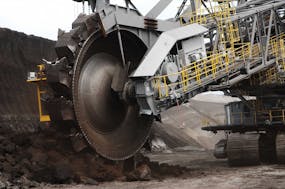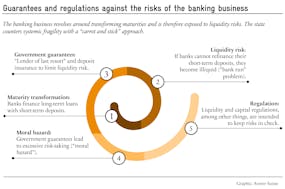Hydroelectricity is a big topic in Switzerland, where about 60 per cent of energy is generated from water thanks to the country’s mountainous topography. Hydropower is also seen as non-polluting, amid efforts to boost renewable energy sources and reduce dependency on ageing nuclear plants.
But weak wholesale electricity prices in Europe have warped the economics of hydroelectricity, with its high capital costs, and focused debate on the concession fees paid by generators to individual municipalities and cantons. In an interview, Avenir Suisse’s Patrick Dümmler discusses the risks to private customers and small businesses of further subsidies for hydroelectricity.
Simon Dalhäuser: Switzerland’s hydropower plant operators have been complaining about economic problems for some time now. How serious are their difficulties?
Patrick Dümmler: Studies show that hydropower is not as badly off as claimed. Moreover, electricity prices have recovered recently, improving profitability. Under the new Energy Act, energy suppliers (EVUs) will also benefit from a so-called ‘market premium’ for 2018-2022. That will channel CHF 110 million a year to hydropower plants.
To put it bluntly: The operators’ complaints are to a certain extent arguing with this in mind, because they are trying to bend legislation their way. Hydropower enjoys very significant political backing – and generators know how to capitalize on it. I even fear further levies in favor of hydroelectricity, most of which will have to be paid by so called ‘trapped’ customers who have no alternatives.
Why does hydropower enjoy so much political goodwill?
First, it’s a matter of geography. Mountain cantons are important hydropower sources, and they have become very adept at political jockeying. They already play a decisive role in subsidising agriculture and in financial equalisation. Secondly, hydropower has a long history in Switzerland: the country is justifiably proud of this masterpiece of Alpine engineering.
While hydropower is subsidised, its competitiveness is burdened by water concession levies. Is that sensible?
Not at all. Water levies serve the mountain cantons for their regional policy aims. This mixture of regional factors and federal energy policy is more than questionable. To separate them, Avenir Suisse has suggested transferring the proceeds of water levies to the inter-cantonal financial equalization system – a proposal we’ve already discussed with mountain cantons. But they see the concessions as a service that should be remunerated, whereas financial equalisation is regarded as a subsidy, with negative connotations. So our proposal hasn’t gone down too well with mountain cantons. Nevertheless, I consider reform inevitable.
The influential Association of Swiss Electricity Companies (VSE) has called for more flexibility in water levies in favor of the EVU, but their voice is politically weaker than that of the mountain cantons. What happens next?
It is at least probable that the EVU and the mountain cantons will join forces in an ‘unholy alliance.’ They could agree that the high water levies should be maintained, but that they should be paid directly by electricity customers – i.e. private households and smaller businesses. The mountain cantons would thus receive income from the water levies, and the energy supply companies would be exempted. Such ideas have already been discussed. But the deal would once again be at the expense of customers, who lack political power.
This interview, conducted by Simon Dalhäuser, appeared in the Swiss business newspaper “Standpunkt der Wirtschaft” on 9 November 2018 (in German)





